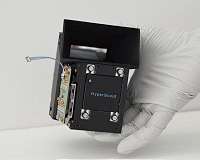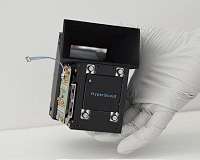As soon as weather in Kourou (French Guiana) permits, a Vega rocket will launch the first HyperScout 2 instrument into orbit. HyperScout 2 is a new version of the HyperScout instrument that contains not only visible and near-infrared hyperspectral bands, but also features thermal bands for the first time on a nanosatellite and artificial intelligence hardware for the first time in space.
An Arianespace Vega rocket is scheduled to launch the Small Spacecraft Mission Service – Proof of Concept from the Guiana Space Center as soon as the weather conditions are favorable. The next possible slot is Monday at 3:51 CEST. Along with 51 other small satellites, the launch will bring FSSCat A and B into orbit, two 6U cubesats from the Nano-Satellite Laboratory at the Technical University of Catalonia-BarcelonaTech, carrying the first HyperScout 2 instrument.
Thermal infrared bands
This HyperScout model provides hyperspectral imaging in the visible and near infrared to analyze composition of the Earth, along with three thermal infrared bands to retrieve the temperature distribution, boosting the number of Earth Observation applications cosine’s customers can benefit from. HyperScout 2 also hosts the ?-sat-1 experiment of the ?-lab of the Earth observation program of the European Space Agency.
The FSSCat consortium is composed of DEIMOS Engenharia (PT), Technical University of Catalonia-BarcelonaTech (ES), Golbriak Space (ET), Tyvak International (IT) and cosine Remote Sensing (NL). The ?-sat-1 consortium is composed of cosine Remote Sensing (NL), University of Pisa (IT), Sinergise (SI) and Ubotica (IE).
HyperScout 2 has been developed with the support of the European Space Agency and the Netherlands Space Office, and is based on 20 years of cosine’s heritage in the development of advanced miniaturized space instrumentation and a strong collaboration with the partners involved.
The launch of the first HyperScout with artificial intelligence capabilities showcases the clever solutions developed by cosine and its partners to overcome many of the volume, mass and power constraints imposed by small satellite platforms.
– Advertisement –


